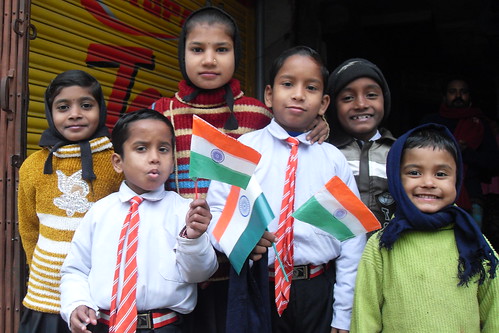By A. Srinivas and Kaneez Fathima,
This year our country completes 60th year of Republic. In these 60 years, were the constitutional principles implemented? Did the governments which came to power in these years follow the constitution? These are not doubts but queries which come to our minds after analyzing the incidents from past.
In this whole period almost all the political parties of our country either came to power or at least shared the power. Did all these governments rule democratically? Congress ruled the country for most of the time. At present in our country, in all the states peoples movements exist in one or the other form. Among them few movements also might be of those who do not believe in the constitution. The movements might be for not only smaller states, self-rule but also to fight against SEZs, and there are struggles by Adivasis as well.
Dr. B.R.Ambedkar said, ‘same value constitution for all based on one vote’. The wealth of the country has increased these days. Poverty has also increased. Wealth is centralized in the hands of few people, which is against the article 39(c) of the constitution. Lakhs of crores of Indian black money is hidden in the Swiss bank.

How many culprits were punished for the violence on Sikh community in 1984, post-Indira Gandhi assassination? What kind of punishment was given to the people who were involved in Gujarat genocide? No one involved in the scams, right from Bofors to Hawala Scams, was punished according to law. Instead, the wealthy culprits were protected. Leaders are elected by the people in democracy; therefore the constitution makers thought that they would work for the betterment of the people and solve their problems. Whereas today all the leaders (no exemption) are elected constitutionally but not justifiably.
In the initial stage of globalization, people did not understand it, but now it is visible in the form of SEZs and coastal corridors. All the lands are being handed over to the corporate sectors without leaving any space even to stand. This is land acquisition policy of the Britishers. Under this act, natural resources are handed over to corporate sectors such as ‘Vedanta’ as part of government’s agenda of “development”; which kind of democracy is it?
Governments should be democratic and should respect the rights given by the constitution; they might be small states, or right to life. Leaders do not honour constitution and police overlook and act against the laws. According to article 2 & 3 of the constitution, when Telangana state is desired by four crores of people, students, intellectuals and political leaders; permission is not given to the gatherings and meetings by saying that anti-social elements exist in the movement. Even the last funeral procession was stopped by saying ‘no permission’ and firing and lathi-charge was done on people. Is it not the dishonour of the constitution by not respecting the constitutional right of the people?
Lastly, politics means to solve the problems emerged due to social and economic conditions. But today politics has become an abusing word. Whoever is in the politics, if they do not behave constitutionally and democratically, then it will be like cutting the branch while sitting on it. Beware!
(The writers are activists, Civil Liberties Monitoring Committee. India)

